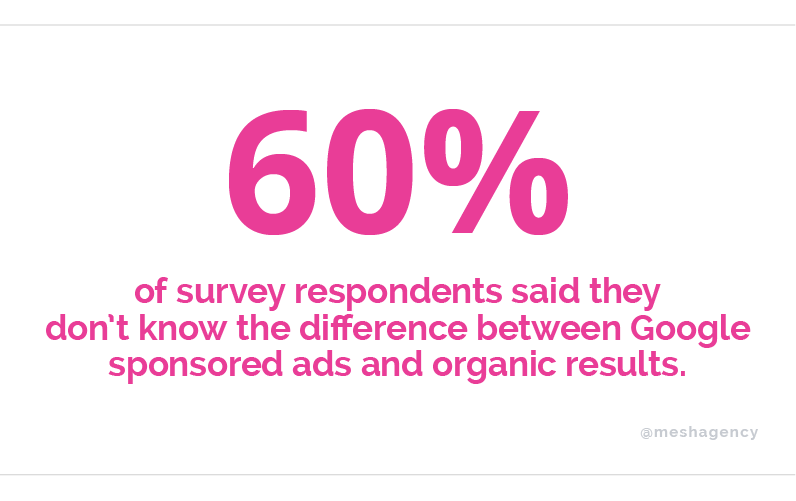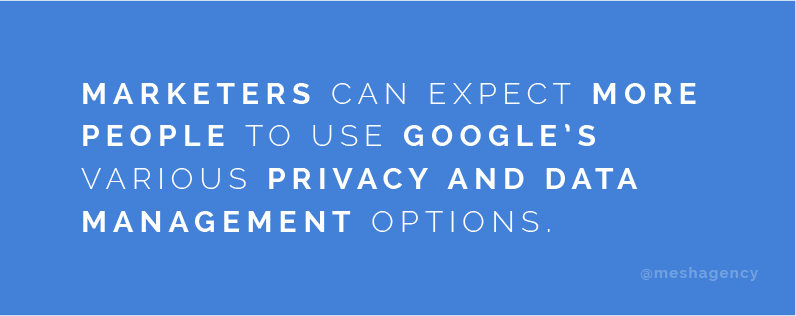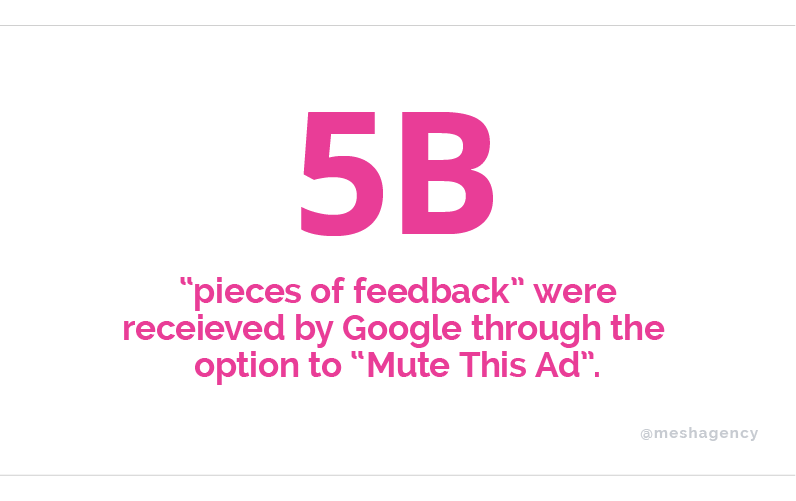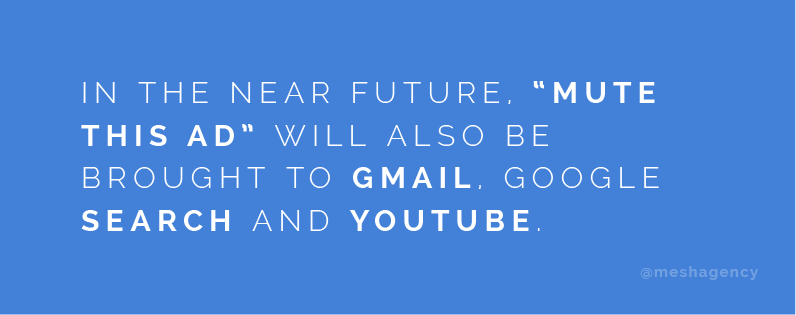Today, it seems like digital privacy concerns are constantly in the headlines, and along with more demand than ever for a non-intrusive online browsing experience.
Your targeted customers and prospects are now savvier than ever when it comes to what’s ‘behind the curtain’ of your Account-Based Marketing campaigns. This behavior is driving a change in how you need to rethink the strategy and planning for your remarketing efforts, especially when they are part of your ABM activities.
Simply explained by Google, remarketing is a digital marketing strategy to “show ads to the people who’ve visited your website or used your mobile app.” Remarketing allows you to reconnect after they leave your site, keeping your brand in front of these people by showing them relevant ads across all of their devices.
According to Smart Insights, 60% of respondents (Ad-Rank Media survey) said they don’t know the difference between Google sponsored ads and organic results.
With that statistic in mind, and with the demands for more privacy transparency from users, Google appears to be waging a war on remarketing. As a B2B marketer, you might not think this impacts you, but it does — in a major way.
Over the past six months, Google has made multiple updates to its remarketing features. While these updates impact all online marketers, the effects will be felt, especially, among B2B marketers.
The longer purchase cycles and repeated purchases that permeate B2B sales naturally lend themselves to remarketing and retargeting campaigns, but with these changes, B2B marketers will no longer be able to use those practices as they have been accustomed to.
Recent Updates to Google’s Ad Settings
Since September, Google has made a series of updates to its Ad Settings. These changes have primarily been to the “Mute This Ad” which was first launched in 2012 and has since become widely used.
Let’s take a minute to walk through four of the key updates and review how they can impact your ABM and digital marketing efforts:
1. New Mobile-Friendly Format to Change Privacy Settings
Google redesigned Google Dashboard in September 2017 to make it more mobile-friendly. The new Dashboard has all the same features but makes it much easier to manage how Google uses personal data in everything from Gmail to its advertising platform. It also includes more optimized viewing for mobile users.
A redesign may have been necessary and initially seems unrelated, but marketers know that an easier user experience correlates with higher engagement rates. Thus, marketers can expect more people to use Google’s various privacy and data management options – including those available in Ad Settings.
In 2017, Google received more than 5 billion “pieces of feedback” through the option to “Mute This Ad” alone. You can expect that number to increase throughout 2018.
2. “Mute This Ad” Now Reaches Across All Devices
The privacy setting changes that users make through “Mute This Ad” will now be synced across all devices they use to sign in to Google. Once a user mutes an ad, they will no longer see it on their office computer, laptop, smartphone, or any other device.
This was the first major change that directly impacts your remarketing campaigns since the practice relies on showing users ads multiple times – often across many platforms and devices. Visibility is the primary focus of remarketing campaigns. Muting across all devices obviously reduces visibility and does so very significantly.
3. “Mute This Ad” Expands to More Platforms
Google will further expand “Mute This Ad” to encompass more platforms in the coming months. Recently, the feature was broadened to include Google’s websites, sites that used Google’s display advertising network, and apps that use the network. In the near future, “Mute This Ad” will also be brought to Gmail, Google Search, and YouTube.
(A quick and important side note, “Mute This Ad” settings don’t impact any advertisements shown through non-Google entities or platforms, such as Facebook.)
As “Mute This Ad” rolls out to more Google entities, user changes will only become more powerful and targeted advertising will become more challenging. The pattern is the same as that of the cross-device implementation.
As “Mute This Ad” rolls out to more Google entities, user changes will only become more powerful and targeted advertising will become more challenging. The pattern is the same as that of the cross-device implementation.
4. New Option to Mute Reminder Ads
Finally, and most significant of all, Google has just added an option to mute “reminder ads,” which is Google’s branding for remarketing or retargeting ads. This choice isn’t merely ad- or campaign-specific but allows users to mute all reminder ads that rely on cookies – at once.
As a marketer, this new option is probably not something you’re thrilled to learn about, but, being on the receiving end of irrelevant ads, you can most likely see its purpose. Removing reminder ads from Google’s display advertising network will have a huge impact on marketers who rely on remarketing as part of their digital marketing strategy. Because Google dominates so much of the online world, marketers can no longer trust that their customers will see retargeted display ads. And even if ads are still presented through Facebook, Amazon, or other non-Google networks, visibility will still be greatly diminished.
Adjust Your ABM Strategies to Respond to These Updates
While Google’s updates do indeed impact your remarketing campaigns including those tied to your ABM strategies, you have several options or workarounds to respond. These will also still allow you provide value to your targeted accounts. Some suggestions include:
Create Highly Targeted Remarketing Ads
You can create more user-specific targeted ads to use in your remarketing campaigns. Even with all the changes, “Mute This Ad” is still an opt-in program. Not everyone will opt-in, and people will be less likely to mute ads if the ones they’re seeing are decidedly relevant to them.
Instead of broadly investing a little in many remarketing campaigns, invest more in a few select campaigns to yield more positive results for your efforts and overall resources.
Creating customized campaigns for select accounts requires more resources, but when they are being well-spent they can grow your largest account or even save one that’s at risk of being lost.
Use More IP-Based ABM Campaigns
IP-based ABM campaigns are a viable alternative to the somewhat more common cookie-based remarketing campaigns. IP-based targeting converts physical addresses to Internet Protocol (IP) addresses and can be used for business targeting.
We bring up this option because while Google hasn’t explicitly said that their most recent changes to remarketing campaigns are in response to new European Union legislation, their increased privacy options accompany changes that they are making on other platforms that come shortly before the EU General Data Protection Regulation (GDPR) goes into effect on May 25, 2018.
The EU GDPR addresses how cookies are used by sites that EU citizens visit. Retargeting campaigns may be impacted because they primarily rely on cookies.
However, IP-based account advertising doesn’t rely on the use of cookies for ad targeting. Therefore, it may be used as a different method of achieving a similar purpose. For B2B marketers who already have the IP addresses of visitors, this is an easy method to implement.
Use Cookie-Based Retargeting Where It’s Permitted
You may want to explore advertising options offered by other networks that still provide cookie-based retargeting capabilities.
While it may not be permissible to use this strategy in Europe come May 25th, cookie use in many other countries (including the United States) is unaffected by the EU GDPR – at least for right now. A service that can use this method (where it’s permitted) may now have an integral role in ABM, even if their network isn’t as vast as Google’s.
Invest in Other (more impactful) ABM Practices
Take a look at investing in ABM practices that don’t rely on retargeting. Email, social media, and content marketing all still have important roles in your B2B marketing and ABM campaigns. You’ll also find plenty of opportunity in sponsoring events, direct marketing, in-person visits, or many other strategies depending on your targeted customer.
There’s no question that the changes Google has made to “Mute This Ad,” and to reminder ads, in particular, are a blow to your digital marketing and ABM efforts. However, you know that the best campaigns provide a level of perceived value to your prospects and customers. When your campaigns are created with this value in mind, your marketing efforts will be viewed as more credible and will better engage your targeted customers.
That said, we know how difficult it can be to stay on top of the constant changes to the marketing and sales tools that impact your day-to-day activities – and overall success.
If you find it challenging to stay up to speed with changes like the ones to Google Ad Blocker we reviewed here, we’d love to talk to you about ways to improve your digital marketing strategy in response to these updates.









